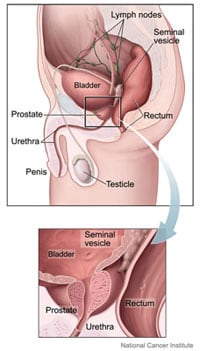“September is Prostate Cancer Awareness Month”
 Prostate cancer is the most common cancer in men. Talk to your doctor about prostate cancer screening.
Prostate cancer is the most common cancer in men. Talk to your doctor about prostate cancer screening.
Cancer is a disease in which abnormal cells in the body grow out of control. When cancer starts in the prostate, it is called prostate cancer. The prostate is a walnut-sized organ located just below the bladder and in front of the rectum in men. It produces fluid that makes up a part of semen.
Not counting some forms of skin cancer, prostate cancer is the most common cancer in American men, and second only to lung cancer in the number of cancer deaths. Every year, more than 200,000 men are diagnosed with prostate cancer, and more than 25,000 men die from it. CDC provides men, doctors, and policymakers with the latest information about prostate cancer.
Symptoms
Different people have different symptoms for prostate cancer. Some men do not have symptoms at all. Some symptoms of prostate cancer are—
- Difficulty in starting urination.
- Weak or interrupted flow of urine.
- Frequent urination, especially at night.
- Difficulty in emptying the bladder completely.
- Pain or burning during urination.
- Blood in the urine or semen.
- Pain in the back, hips, or pelvis that doesn’t go away.
- Painful ejaculation.
If you have any symptoms that worry you, be sure to see your doctor right away. These symptoms may be caused by conditions other than prostate cancer.
Risk Factors
There is no way to know for sure if you will get prostate cancer. Men have a greater chance of getting prostate cancer if they are 50 years old or older, are African-American, or have a father, brother, or son who has had prostate cancer.
Screening for Prostate Cancer
Not all medical experts agree that screening for prostate cancer will save lives. The U.S. Preventive Services Task Force (USPSTF) recommends against prostate-specific antigent (PSA)-based screening![]() for men that do not have symptoms. The potential benefit of prostate cancer screening is early detection of cancer, which may make treatment more effective. Potential risks include false positive test results (the test says you have cancer when you do not), treatment of prostate cancers that may never affect your health, and mild to serious side effects from treatment of prostate cancer.
for men that do not have symptoms. The potential benefit of prostate cancer screening is early detection of cancer, which may make treatment more effective. Potential risks include false positive test results (the test says you have cancer when you do not), treatment of prostate cancers that may never affect your health, and mild to serious side effects from treatment of prostate cancer.

Most organizations recommend that men discuss with their doctors the benefits and risks of prostate cancer screening. CDC continues to support informed decision making, which encourages men to talk with their doctors to learn the nature and risk of prostate cancer, understand the benefits and risks of the screening tests, and make decisions consistent with their preferences and values.
Tests that are commonly used to screen for prostate cancer are—
- Digital rectal exam (DRE): A doctor, nurse, or other health care professional places a gloved finger into the rectum to feel the size, shape, and hardness of the prostate gland.
- Prostate specific antigen test (PSA): PSA is a substance made by the prostate. The PSA test measures the level of PSA in the blood, which may be higher in men who have prostate cancer. However, other conditions such as an enlarged prostate, prostate infections, and certain medical procedures also may increase PSA levels.







